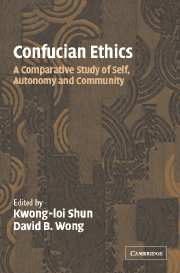Book contents
- Frontmatter
- Contents
- Contributors
- Contributors
- Introduction
- SECTION I RIGHTS AND COMMUNITY
- SECTION II SELF AND SELF-CULTIVATION
- 5 Tradition and Community in the Formation of Character and Self
- 6 A Theory of Confucian Selfhood: Self-Cultivation and Free Will in Confucian Philosophy
- 7 The Virtue of Righteousness in Mencius
- 8 Conception of the Person in Early Confucian Thought
- SECTION III COMMENTS
- Glossary of Chinese Terms
- Index
- References
5 - Tradition and Community in the Formation of Character and Self
Published online by Cambridge University Press: 08 December 2009
- Frontmatter
- Contents
- Contributors
- Contributors
- Introduction
- SECTION I RIGHTS AND COMMUNITY
- SECTION II SELF AND SELF-CULTIVATION
- 5 Tradition and Community in the Formation of Character and Self
- 6 A Theory of Confucian Selfhood: Self-Cultivation and Free Will in Confucian Philosophy
- 7 The Virtue of Righteousness in Mencius
- 8 Conception of the Person in Early Confucian Thought
- SECTION III COMMENTS
- Glossary of Chinese Terms
- Index
- References
Summary
Call the world if you Please “The vale of Soul-making.” … There may be intelligences or sparks of the divinity in millions – but they are not Souls till they acquire identities, till each one is personally itself.
John Keats (1970, pp. 249–50), from a letter to his brother and sister-in-law in Kentucky, 1819This chapter will explore the role of tradition and community in the process in which a human being becomes “personally itself.” The argument will be (1) that tradition and community are constitutive as well as causal factors, so that they will contribute to elements of the soul or self that is formed, (2) that how they do this has a great deal to do with the excellence of the result, and (3) that Confucius gives an exceptionally good account of this in the stages corresponding to advanced education.
Our exploration will begin with the early stages and the development in childhood of the foundation of self. Then we will examine the development in teenage and early adult years, and how someone becomes a really good person. Finally, we need to pay some attention to general issues concerning the unity of the self and also creativity. To become personally oneself is an exceptionally important activity and, if done well, can be a creative achievement; we will need to examine the role of tradition and community in creativity generally.
- Type
- Chapter
- Information
- Confucian EthicsA Comparative Study of Self, Autonomy, and Community, pp. 103 - 123Publisher: Cambridge University PressPrint publication year: 2004
References
- 10
- Cited by



